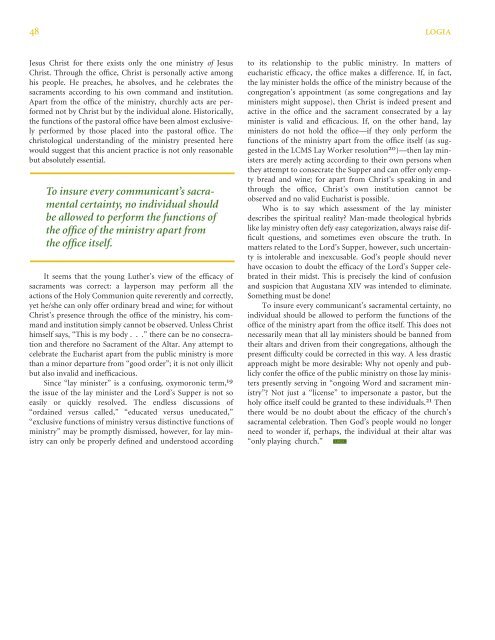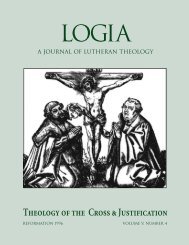ONLY PLAYING CHURCH? 47the faith of the communicants, can effect the true presenceof the body and blood of Christ in the Supper.This is to be ascribed only to the almighty power ofGod and the Word, institution, and ordinance of ourLord Jesus Christ. . . . Chrysostom says in his Sermonon the Passion: “Christ himself prepares this table andblesses it. No human being, but only Christ himselfwho was crucified for us, can make of the bread andwine set before us the body and blood of Christ. Thewords are spoken by the mouth of the priest, but byGod’s power and grace through the words that hespeaks, ‘This is my body,’ the elements set before us inthe Supper are blessed. . . .” [SD VII, 74, 76].No mere mortal is capable of presenting the Supper. It is Christhimself, through the pastor, who prepares the sacrament andblesses it. Luther’s insights into the consecration of the Supperare cited in support of this position in the Solid Declaration.“[I]f I were to say over all the bread there is, ‘This isthe body of Christ,’ nothing would happen, but whenwe follow his institution and command in the Lord’sSupper and say, ‘This is my body,’ then it is his body,not because of our speaking or of our efficaciousword, but because of his command in which he hastold us so to speak and to do and has attached his owncommand and deed to our speaking” [SD VII, 78].To attempt consecration in the third person singular,“This is the body of Christ,” is here said to be contrary to thedivine institution and therefore fruitless. Apart from an incantationalrecitation of the words of institution (which Chemnitzdisallowed above), the laity can not employ the first person singularconsecration, “This is my body,” and have it apply to thebody of Christ because the antecedent of “my body” is the individual’sown body. For a layperson to attempt consecrationwith the formula “Christ said, ‘This is my body,’” is to resort tomere historical narrative which has also been rejected above. Inthe final assessment, only a minister, by virtue of the office, canspeak the words of institution according to Christ’s command,for only a pastor can genuinely consecrate the Supper in thefirst person singular. When, through the instrument of the pastor,Christ himself is present and declares, “This is my body,”then and only then is the Holy Communion efficacious. 17 Theoffice makes the difference. It must be ever maintained that theLord’s Supper is not robbed of its efficacy when administeredby unworthy or evil ministers [Ap VII and VIII, 28, 47]. Neitheris the intention of the officiant of any consequence, as Chemnitzdeclared: “Faith may hold the sacrament to be true andhave true efficacy when it is administered according to the institution,no matter what the minister either thinks or believes orintends, if only he preserves the institution of Christ in theadministration.” 18 In 1533 Luther went so far as to suggest thateven the devil himself could celebrate a valid sacrament.[L]et us suppose that I found out afterward that thedevil had inveigled his way into the office by stealthor, having assumed the form of a man, let himself becalled to the office of the ministry, and publiclypreached the gospel in the church, baptized, celebratedmass, absolved and exercised and administeredsuch offices and sacraments, as a pastor would,according to the command of Christ—then we wouldfor all that have to admit that the sacraments werevalid, that we had received a valid baptism, had heardthe true gospel, obtained true absolution, and hadparticipated in the true sacrament of the body andblood of Christ.For our faith and the sacrament must not bebased on the person, whether he is godly or evil, consecratedor unconsecrated, called or an impostor,whether he is the devil or his mother, but upon Christ,upon his word, upon his office, upon his commandand ordinance; where these are in force, there everythingwill be carried out properly, no matter who orwhat the person might happen to be [AE 38:200, 201].. . . the public ministry must beunderstood christologically—the officeis a concrete expression of Christ’spresence in the congregation.Christ’s body and blood would be present under the elementseven though administered by the devil himself if two basicrequirements were satisfied: if the sacrament was celebrated inaccordance with the divine command, and if the devil held theoffice of the ministry through which Christ personally functions.The office, not the person who fills it, is a most importantconsideration in determining sacramental efficacy. Lutherillustrated this truth with his usual eloquence.Offices and sacraments always remain in the church;persons are daily subject to change. As long as we calland induct into the offices persons who can administerthem, then the offices will surely continue to beexercised. The horse has been bridled and saddled; ifyou place on it even a naked lad who can ride, thehorse will proceed as well as if the emperor or thepope were riding it [AE 38:201].Even a boy may be set in the saddle and ride, but any attemptto jog alongside is an altogether different proposition.LUTHER WAS CORRECTAccording to the early Lutheran fathers, the public ministrymust be understood christologically; the office is a concreteexpression of Christ’s presence in the congregation.Christ is not a distant or absent lord but the ever-present Lordof the church! He is the foundation upon which the publicministry is built. Consequently, there can be no ministry about
48 LOGIAJesus Christ for there exists only the one ministry of JesusChrist. Through the office, Christ is personally active amonghis people. He preaches, he absolves, and he celebrates thesacraments according to his own command and institution.Apart from the office of the ministry, churchly acts are performednot by Christ but by the individual alone. Historically,the functions of the pastoral office have been almost exclusivelyperformed by those placed into the pastoral office. Thechristological understanding of the ministry presented herewould suggest that this ancient practice is not only reasonablebut absolutely essential.To insure every communicant’s sacramentalcertainty, no individual shouldbe allowed to perform the functions ofthe office of the ministry apart fromthe office itself.It seems that the young Luther’s view of the efficacy ofsacraments was correct: a layperson may perform all theactions of the Holy Communion quite reverently and correctly,yet he/she can only offer ordinary bread and wine; for withoutChrist’s presence through the office of the ministry, his commandand institution simply cannot be observed. Unless Christhimself says, “This is my body . . .” there can be no consecrationand therefore no Sacrament of the Altar. Any attempt tocelebrate the Eucharist apart from the public ministry is morethan a minor departure from “good order”; it is not only illicitbut also invalid and inefficacious.Since “lay minister” is a confusing, oxymoronic term, 19the issue of the lay minister and the Lord’s Supper is not soeasily or quickly resolved. The endless discussions of“ordained versus called,” “educated versus uneducated,”“exclusive functions of ministry versus distinctive functions ofministry” may be promptly dismissed, however, for lay ministrycan only be properly defined and understood accordingto its relationship to the public ministry. In matters ofeucharistic efficacy, the office makes a difference. If, in fact,the lay minister holds the office of the ministry because of thecongregation’s appointment (as some congregations and layministers might suppose), then Christ is indeed present andactive in the office and the sacrament consecrated by a layminister is valid and efficacious. If, on the other hand, layministers do not hold the office—if they only perform thefunctions of the ministry apart from the office itself (as suggestedin the LCMS Lay Worker resolution 20 )—then lay ministersare merely acting according to their own persons whenthey attempt to consecrate the Supper and can offer only emptybread and wine; for apart from Christ’s speaking in andthrough the office, Christ’s own institution cannot beobserved and no valid Eucharist is possible.Who is to say which assessment of the lay ministerdescribes the spiritual reality? Man-made theological hybridslike lay ministry often defy easy categorization, always raise difficultquestions, and sometimes even obscure the truth. Inmatters related to the Lord’s Supper, however, such uncertaintyis intolerable and inexcusable. God’s people should neverhave occasion to doubt the efficacy of the Lord’s Supper celebratedin their midst. This is precisely the kind of confusionand suspicion that Augustana XIV was intended to eliminate.Something must be done!To insure every communicant’s sacramental certainty, noindividual should be allowed to perform the functions of theoffice of the ministry apart from the office itself. This does notnecessarily mean that all lay ministers should be banned fromtheir altars and driven from their congregations, although thepresent difficulty could be corrected in this way. A less drasticapproach might be more desirable: Why not openly and publiclyconfer the office of the public ministry on those lay ministerspresently serving in “ongoing Word and sacrament ministry”?Not just a “license” to impersonate a pastor, but theholy office itself could be granted to these individuals. 21 Thenthere would be no doubt about the efficacy of the church’ssacramental celebration. Then God’s people would no longerneed to wonder if, perhaps, the individual at their altar was“only playing church.” LOGIA
















